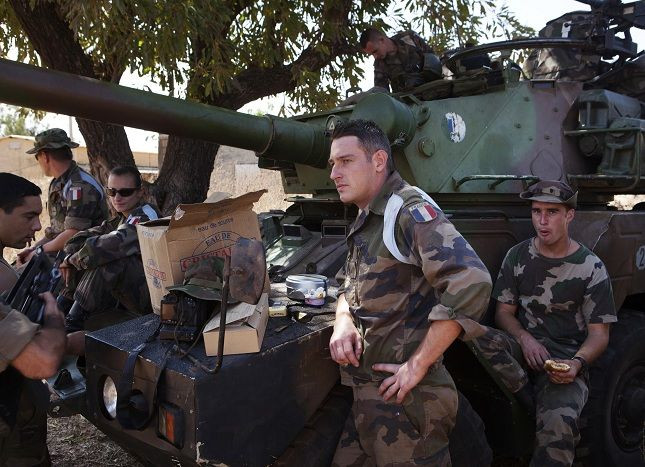Western Powers Rally Behind French Intervention In Mali

France may be leading the fight against an insurgency in the West African country of Mali, but it's not going it alone.
African and Western powers are ramping up their support for French soldiers in their battle against the rebels, which has been dubbed Operation Serval after an African wildcat. With help from regional troops and logistical support from superpowers such as the United States, the French intervention has made significant progress this week.
The New York Times reports that the central towns of Douentza and Diabali, formerly held by Islamists, are now back under Malian control. French troops were welcomed by most of the towns’ residents, who had been suffering under the strict version of Shariah, or Islamic law, imposed by the militants.
The Malian insurgency began in December of 2011, and over the past year Islamist rebels -- some affiliated with al Qaeda in the Islamic Mahreb, or AQIM -- have set up camp in the sparsely populated, semi-arid reaches of northern Mali, an area the size of France.
According to a statement on Tuesday from the Department of Defense, the U.S. military has been providing intelligence, supplies and airlift support to French troops. Washington has refused to put American boots on the ground in Mali, but commandos engaging in intelligence operations may already be operating clandestinely in the region.
The UK has lent at least two aircraft to French forces in Mali, and Prime Minister David Cameron said on Tuesday that more British assistance may be on the way. The Guardian reports that some UK special forces are in fact already in Mali in a strictly noncombat role that involves intelligence and logistical assistance.
The Economic Community of West African States, or ECOWAS, has for months planned to devote thousands of troops to the fight against Malian insurgents, but France’s sudden intervention 11 days ago, which essentially nullified plans to make this an African-led effort, has forced them to speed up efforts.
Nigeria, Belgium, Canada, Germany, Italy and others have also pledged support.
All told, France has about 2,150 troops on the ground, and that number may grow to surpass the originally planned full force of 2,500. Those soldiers are currently working with their Malian counterparts; Bamako had plans to devote 5,000 of its own troops to the mission. ECOWAS has recently increased its intended deployment from 3,300 to 5,800 soldiers, but only about 1,000 have arrived in Mali so far.
The number of rebel fighters in Mali is difficult to pin down for a number of reasons: The insurgents represent various Islamist groups, many are able to blend into civilian populations, and new fighters are constantly arriving from other countries. Across the region, AQIM alone is estimated to have something in the neighborhood of 1,000 fighters, but even that number is in constant flux.
French President Francois Hollande has noted that the insurgency presents a threat not only to Mali, but to global security -- and Western officials agree. U.S. Secretary of Defense Leon Panetta, Cameron and others have pledged support in order to prevent the establishment of a West African safe haven for terrorists linked to al Qaeda.
But it is France in particular that has traditionally played a major role as diplomatic partner to Francophone countries in West Africa, most of which were French colonies at some point during the past century. In the case of Mali, the military intervention came at the behest of the national transitional government.
But that’s not the only reason France is leading the charge against the Islamists in the Sahel.
“France is becoming the last serious military power left in Europe,” Michael Shurkin, a former intelligence worker who is now a political scientist at the Rand Corporation in Washington, D.C., said.
“The British and Germans have been doing some very drastic budget cuts, limiting their abilities to project force abroad and sustain them for a long period of time. But France has been protecting its capabilities, cutting every possible corner to protect the major programs. They’re almost at the tipping point where any more budget cuts could prevent them from doing this.”
With a budget deficit of about $116 billion last year, France would seem an unlikely candidate to spend heavily on an African offensive. The superpower’s economic growth is burdened by high unit labor costs and falling exports, and high social spending remains a high priority for much of the population. Still, France outlined an external defense operations budget of $838 million for 2013, and, in fact, the majority of the French population supports the Mali offensive.
“I think that with the French there’s a long-term question: How long can they sustain this?” Shurkin said. “I think they can for a while, unless military budget cuts get in the way.”
Recent successes in Mali bode well for France’s operation in Mali, but this is only the beginning. Over the past decade, comparable Western offensives against Islamist militants have turned into protracted conflicts in places like Iraq and Afghanistan, costing lives and sapping resources.
It will be up to French, Malian and ECOWAS troops to respond intelligently to the Malian crisis -- with an eye to varying community dynamics, ethnic divisions and an ever-shifting kaleidoscope of Islamist networks in the region -- in order to avoid turning Serval into a quagmire.
© Copyright IBTimes 2025. All rights reserved.






















